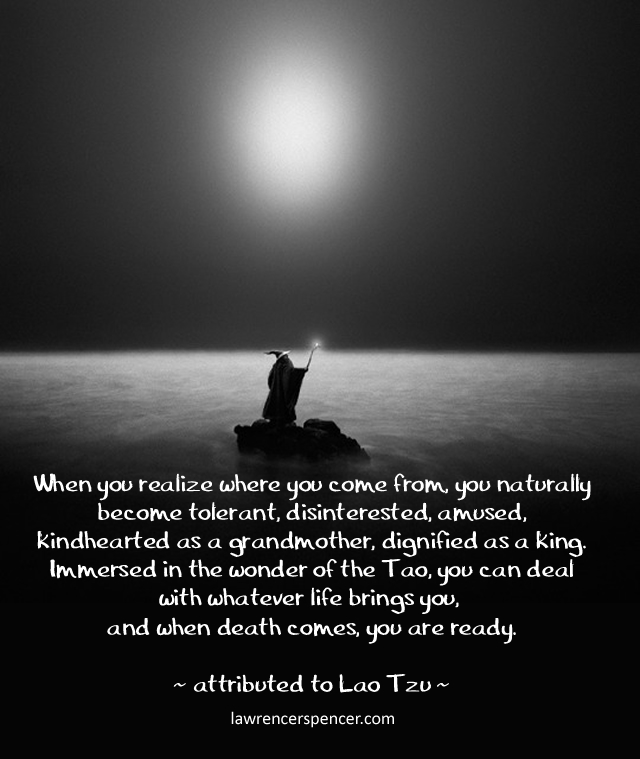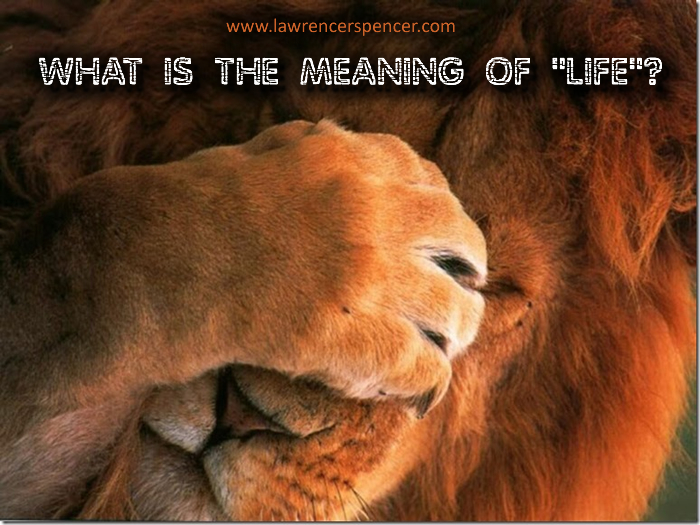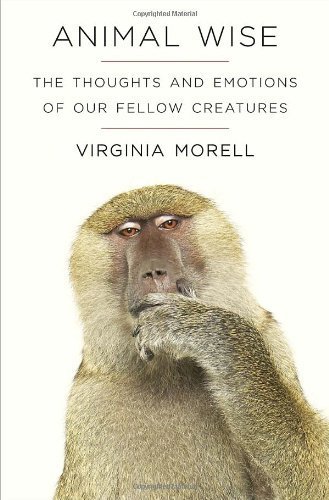Republished by Blog Post Promoter
Tag Archives: life
IMITATION LIFE
Republished by Blog Post Promoter
Art imitates life, and life imitates art. Cell phones are imitation life.
EPHEMERAL MAN
Republished by Blog Post Promoter
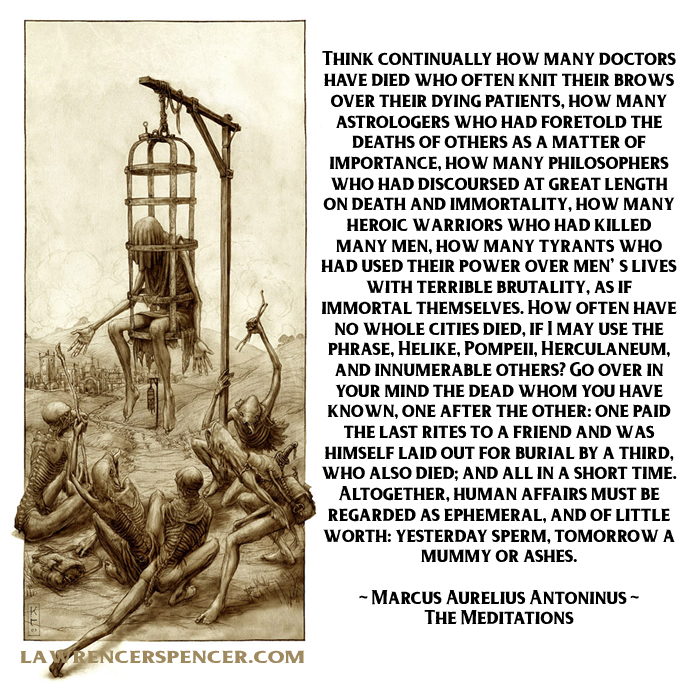 “Think continually how many doctors have died who often knit their brows over their dying patients, how many astrologers who had foretold the deaths of others as a matter of importance, how many philosophers who had discoursed at great length on death and immortality, how many heroic warriors who had killed many men, how many tyrants who had used their power over men’s lives with terrible brutality, as if immortal themselves. How often have no whole cities died, if I may use the phrase, Helike, Pompeii, Herculaneum, and innumerable others? Go over in your mind the dead whom you have known, one after the other: one paid the last rites to a friend and was himself laid out for burial by a third, who also died; and all in a short time. Altogether, human affairs must be regarded as ephemeral, and of little worth: yesterday sperm, tomorrow a mummy or ashes.”
“Think continually how many doctors have died who often knit their brows over their dying patients, how many astrologers who had foretold the deaths of others as a matter of importance, how many philosophers who had discoursed at great length on death and immortality, how many heroic warriors who had killed many men, how many tyrants who had used their power over men’s lives with terrible brutality, as if immortal themselves. How often have no whole cities died, if I may use the phrase, Helike, Pompeii, Herculaneum, and innumerable others? Go over in your mind the dead whom you have known, one after the other: one paid the last rites to a friend and was himself laid out for burial by a third, who also died; and all in a short time. Altogether, human affairs must be regarded as ephemeral, and of little worth: yesterday sperm, tomorrow a mummy or ashes.”
| Marcus Aurelius Antoninus, The Meditations |
Marcus Aurelius Antoninus — 26 April 121 – 17 March 180 AD) was Roman Emperor from 161 to 180. He ruled with Lucius Verus as co-emperor from 161 until Verus’ death in 169. He was the last of the Five Good Emperors, and is also considered one of the most important Stoic philosophers.
During his reign, the Empire defeated a revitalized Parthian Empire in the East: Aurelius’ general Avidius Cassius sacked the capital Ctesiphon in 164. In central Europe, Aurelius fought the Marcomanni, Quadi, and Sarmatians with success during the Marcomannic Wars, although the threat of the Germanic tribes began to represent a troubling reality for the Empire. A revolt in the East led by Avidius Cassius failed to gain momentum and was suppressed immediately.
Marcus Aurelius’ Stoic tome Meditations, written in Greek while on campaign between 170 and 180, is still revered as a literary monument to a philosophy of service and duty, describing how to find and preserve equanimity in the midst of conflict by following nature as a source of guidance and inspiration.
WHERE YOU CAME FROM
Republished by Blog Post Promoter
THE MEANING OF “LIFE”
Republished by Blog Post Promoter
If you have spent any time with animals you should have observed that they experience emotions similar to our own. Animals can communicate between themselves, or with other species, including humans, with amazing sensitivity. Many experiments have been conducted that conclusively demonstrate extrasensory abilities and perceptions of animals. Millions of people in India consider that the reincarnated souls of humans inhabit the bodies of every kind of life form. Therefore, every life form is is “sacred” and entitled to live freely within human society.
However, the “civilized” Westerner does not possess an awareness of personal spiritual immortality. Instead, human beings in Western “civilization” considers themselves to be the “highest attainment of evolution”. Or, that humans embody “the image of The Creator”. There is no concept of “personal spiritual immortality”. It is virtually inconceivable to the “civilized Westerner” that spiritual beings inhabit and animate life forms. Rather, the animation of life is a “mysterious and unknowable” phenomenon that is being “studied” by the priests of Western culture: “scientists”.
A “scientist” is a professional academician or “priest” whose “religious belief” is that the “entire universe consists of nothing more than solid matter, energy, space and time”, including living organisms. These “priests” possess a profound inability to observe the obvious fact that LIFE FORMS ARE ANIMATED BY SPIRITUAL BEINGS!
Question: What is the definition, or meaning of “LIFE”?
Answer: A material form or organism which is animated and motivated by a non-material energy source, or “spirit”.
Factually, Western “science” does not have working definition for the word “LIFE”. As a consequence, the “average” American and European human view of themselves as a life form is egocentric, myopic, ignorant, self-aggrandizing and pathetically barbaric. Visit any grocery store or restaurant anywhere in the western world, and it becomes instantly apparent that human beings are carnivorous predators who consider that other animals are a primary and necessary food source!
This idea is very, very similar to the belligerently aristocratic notion of “great” Britain that “the brown races” are the natural subjects of the white race, and that it is the “manifest destiny” of Caucasians to rule over them and use them as slaves. Thus, the British Empire, which invaded and conquered all by 22 of the nations of Earth, entitled and bequeathed unto themselves the “god-given right” to murder, steal from, indenture or enslave nearly the entire population of humans and every other life form on the planet! The Nazis Third Reich was motivated and empowered with a religious conviction that they were entitled, as “the Master Race”, to rule the world!
What is the difference between the philosophy of these genocidal “civilizations” and the philosophy that “humans are the highest life form on Earth”? In both cases, these philosophies are used by humans as justification to murder, slaughter, enslave or EAT almost every living organism on Earth! I suggest that human beings are nothing more than stupid savages as regards their awareness and treatment of themselves and every other life form on Earth.
If you would like to “cure” your own ignorance or superstitions on the subject of “LIFE”, I recommend that you read the very excellent book, Animal Wise: The Thoughts and Emotions of Our Fellow Creatures by Virginia Morell.
From the publishers promo about the book:
“Did you know that ants teach, earthworms make decisions, rats love to be tickled, and chimps grieve? Did you know that some dogs have thousand-word vocabularies and that birds practice songs in their sleep? That crows improvise tools, blue jays plan ahead, and moths remember living as caterpillars?
Animal Wise takes us on a dazzling odyssey into the inner world of animals, from ants to elephants to wolves, and from sharp-shooting archerfish to pods of dolphins that rumble like rival street gangs. Morell probes the moral and ethical dilemmas of recognizing that even “lesser animals” have cognitive abilities such as memory, feelings, personality, and self-awareness–traits that many in the twentieth century felt were unique to human beings.”

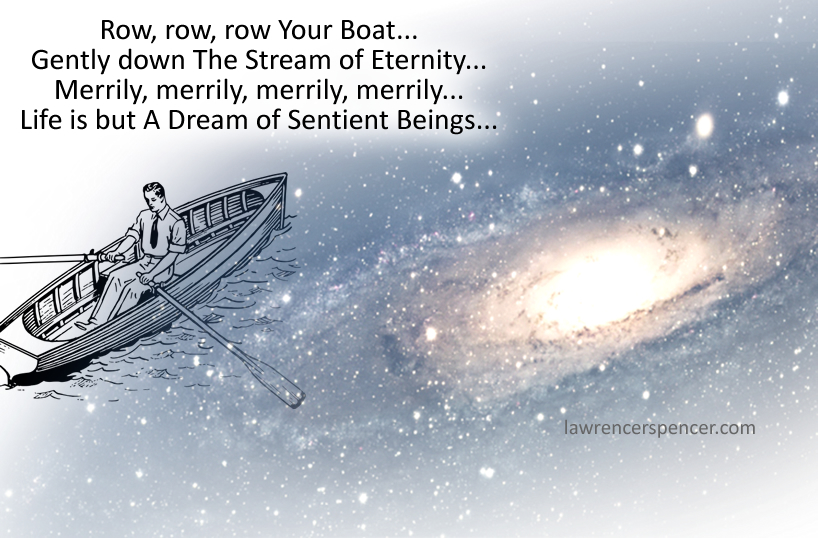 Row, row, row Your Boat…
Row, row, row Your Boat…